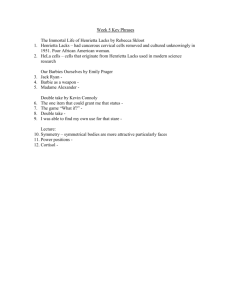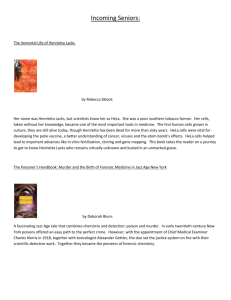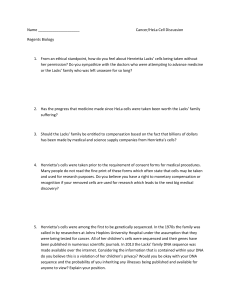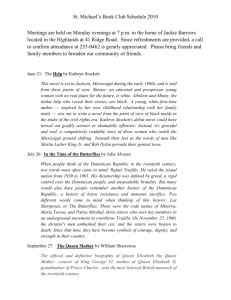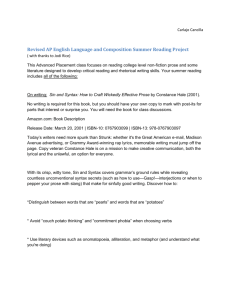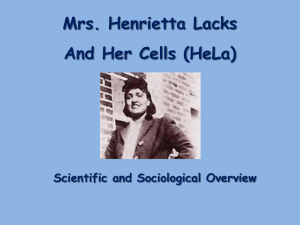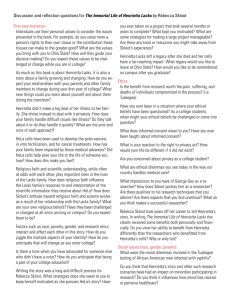Henrietta Lacks Paper
advertisement
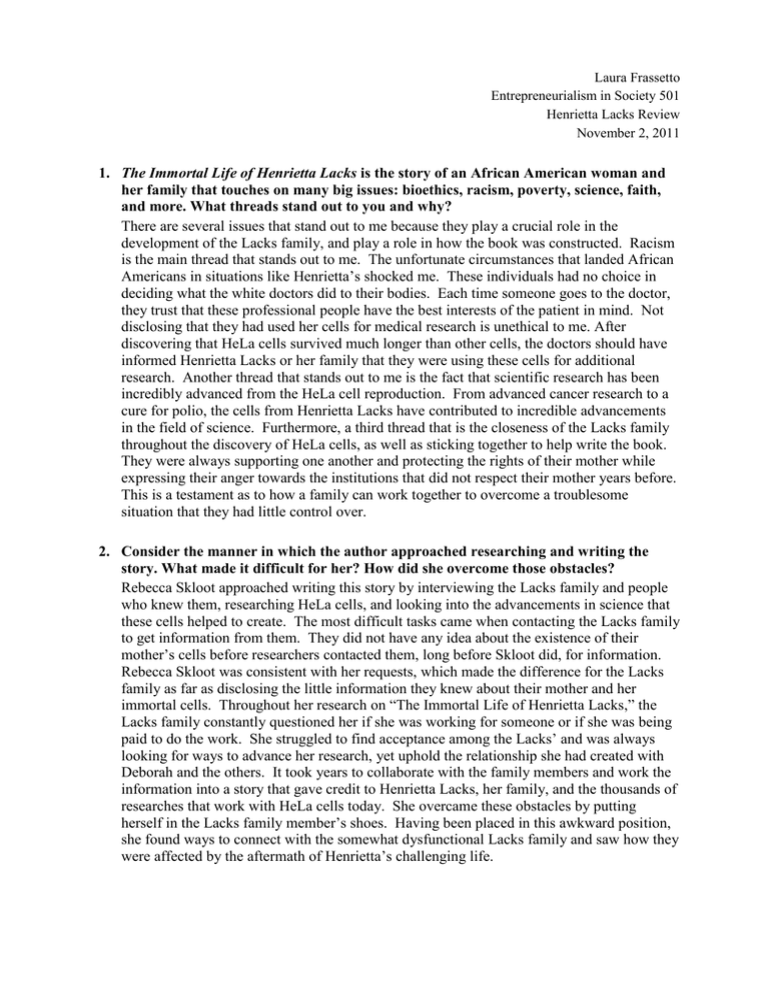
Laura Frassetto Entrepreneurialism in Society 501 Henrietta Lacks Review November 2, 2011 1. The Immortal Life of Henrietta Lacks is the story of an African American woman and her family that touches on many big issues: bioethics, racism, poverty, science, faith, and more. What threads stand out to you and why? There are several issues that stand out to me because they play a crucial role in the development of the Lacks family, and play a role in how the book was constructed. Racism is the main thread that stands out to me. The unfortunate circumstances that landed African Americans in situations like Henrietta’s shocked me. These individuals had no choice in deciding what the white doctors did to their bodies. Each time someone goes to the doctor, they trust that these professional people have the best interests of the patient in mind. Not disclosing that they had used her cells for medical research is unethical to me. After discovering that HeLa cells survived much longer than other cells, the doctors should have informed Henrietta Lacks or her family that they were using these cells for additional research. Another thread that stands out to me is the fact that scientific research has been incredibly advanced from the HeLa cell reproduction. From advanced cancer research to a cure for polio, the cells from Henrietta Lacks have contributed to incredible advancements in the field of science. Furthermore, a third thread that is the closeness of the Lacks family throughout the discovery of HeLa cells, as well as sticking together to help write the book. They were always supporting one another and protecting the rights of their mother while expressing their anger towards the institutions that did not respect their mother years before. This is a testament as to how a family can work together to overcome a troublesome situation that they had little control over. 2. Consider the manner in which the author approached researching and writing the story. What made it difficult for her? How did she overcome those obstacles? Rebecca Skloot approached writing this story by interviewing the Lacks family and people who knew them, researching HeLa cells, and looking into the advancements in science that these cells helped to create. The most difficult tasks came when contacting the Lacks family to get information from them. They did not have any idea about the existence of their mother’s cells before researchers contacted them, long before Skloot did, for information. Rebecca Skloot was consistent with her requests, which made the difference for the Lacks family as far as disclosing the little information they knew about their mother and her immortal cells. Throughout her research on “The Immortal Life of Henrietta Lacks,” the Lacks family constantly questioned her if she was working for someone or if she was being paid to do the work. She struggled to find acceptance among the Lacks’ and was always looking for ways to advance her research, yet uphold the relationship she had created with Deborah and the others. It took years to collaborate with the family members and work the information into a story that gave credit to Henrietta Lacks, her family, and the thousands of researches that work with HeLa cells today. She overcame these obstacles by putting herself in the Lacks family member’s shoes. Having been placed in this awkward position, she found ways to connect with the somewhat dysfunctional Lacks family and saw how they were affected by the aftermath of Henrietta’s challenging life. 3. Some would consider the manner in which the author approached her research and interviews as entrepreneurial. Consider and reflect on the innovative methods she used to get people to talk with her. What were they? What risk was associated with her pursuing this writing project? Rebecca Skloot is an unbelievable author whose style of writing is extremely vivid and inspirational. An entrepreneur is someone who uses innovation and creates something they are passionate about. Henrietta Lacks’ story is one that not many people have heard about, and it has definitely not gotten the recognition that it deserves. Skloot demonstrated entrepreneur spirit by starting to document this story although many people doubted her. The way she went about interviewing people was unique, to say the least. Her quest for sources of information was especially characteristic in that she would simply drive to Henrietta’s hometown to ask the residents for any information they could provide. Venturing throughout several areas of the south, she and Deborah visited many places where Henrietta had been years before. Furthermore, they visited John Hopkins and talked to several researchers who were currently working with HeLa cells in an attempt to find a cure for many of the diseases that affect our population. The biggest risk that Rebecca Skloot undertook was her unemployment for many years. Being an entrepreneur means trusting yourself when others doubt you. Failing to communicate with the Lacks family would cost her much of Henrietta’s story and being able to justly tell both sides of it. Performing the amount of research that Skloot, or any entreprener puts in, and not succeeding is devastating. Fortunately, with the patience and empathy that Skloot demonstrated, she was able to complete the Henrietta Lacks’ story successfully. 4. What was gained by the author and by others from the writing/publication of this book? Ultimately, I believe that we, as readers, have the most to gain from the Henrietta Lacks story. Neither in science classes nor in other classes throughout my schooling did I hear about the immortal HeLa cells and the powerful impact they have on the health field. I learned that, although we have had incredible breakthroughs in science in the recent years, the costs that are attached to this are substantial. Rebecca Skloot, in my opinion, learned a lot about herself throughout the process of putting this story together. I could sense a change in attitude toward the Lacks family as she became more personal with Deborah. In addition, she gained insight into what it means to have faith, a supportive family, and a positive outlook on life, even after tragedy has struck. Skloot’s time spent on this story was immeasurable, but the powerful effect of the Henrietta Lacks story makes every minute of her research worth it. 1. The author notes social inequities both explicitly and implicitly. What parts of Henrietta’s story might be different if she had been white? What might have been different if she had been middle or upper-middle class? It is obvious that the treatment of blacks and whites was different back then. Henrietta, after being diagnosed with cervical cancer, was used by John Hopkins Hospital in much the same way research animals are used. Many of the doctors back then were white, causing the blacks to place full trust in these educated men and women without fully understanding the effects of their time spent in the hospital. After Howard Jones extracted the cells from the cancerous tumor in Henrietta’s cervix, he found that these cells were special. If Henrietta would have been white, I believe there would have been a much greater recognition for the effects that her cells have had on health and science. In addition, when many researchers were calling her family and asking about Helen Lakes or another made-up name, it shows that they were more worried about these cells instead of what happened to the woman whose cells were taken. Being a member of the lower class, Henrietta’s family struggled to provide the necessities of everyday living. Day worked hard to give his family an adequate lifestyle, but there was never enough money for better health care or second opinions in Henrietta’s case. Being a member of the middle or upper-middle class would have allowed Henrietta’s family to get answers about her cells earlier through interventions, allowing research to be done. Overall, the treatment of blacks in the health care system was poor in the time of Henrietta’s circumstance. It is also still surprising that Henrietta’s family does not have proper health care, considering their mother’s cells were so significant in the health care system. 2. What role did the deferential attitude toward doctors in the early 20th century play in the interaction between Henrietta and her family and Johns Hopkins? How has that attitude toward doctors changed over the decades? Do patients’ socioeconomic differences affect the relationship today? During Henrietta’s treatment, the doctors at John Hopkins were the only people the Lacks’ family trusted to perform radium treatment. They went to the doctor with the hopes of getting the best service and treatment possible, without knowing the effects of it. Now days, people are always getting second opinions about medical diagnosis and looking for the best doctor to treat their condition. The attitude towards doctors is substantially better because of the practice and certifications that doctors are required to have today. With more research out there, everyone reads about the condition they have because of information on the internet. Going to the doctor with a self-diagnosis was not possible back then. Before modern healthcare, all trust was placed in the doctor and hoping they had your best interest in mind. With a lower income, families during the early 20th century had to pay the price in their health care as well. The government did not help nearly as much as they do today in health care expenses. Low-income and many other types of families are covered by state and national health care. Using a program like BadgerCare, families are allowed to visit a doctor that treats patients of all socioeconomic divisions without being classified as “poor” or unfit to receive medical assistance. 3. The book is filled with stories of people used as research subjects, sometimes without their knowledge, sometimes with ill-informed consent, sometimes because of their inability to understand (patients with mental illness) or resist (prisoners). Were you aware of this history before reading the book? Do you think doctors and researchers of the past had a fundamentally different view of people than they do today? I was not aware of people used as research subjects before reading this book. I read with astonishment that this occurred not too long ago. The way the health care system was run had lasting effects not only on the patients, but also on families who did not know any better. It is cruel to use people to test out viruses and other diseases, knowing the harmful effects that it had on the subjects. Doctors and researchers today undoubtedly have a fundamentally different view of people as test subjects. Although science is still evolving and new cures and prevention strategies are coming, modern research use a much more ethical procedure. People are no longer taken advantage of. They know exactly what the doctors are going to do and the risks involved. More people are able to pay for better health care, which, in turn, allows them to receive the necessary treatments. Doctors now have our best interests at heart and know that performing an operation like those performed on Henrietta Lacks could cost them their job. With better prevention and nutrition, the death rate is much lower than decades ago, causing people not to participate in studies that could potentially harm their health. 4. Today the definition of ‘informed consent’ remains murky. What did you learn about what it means or doesn’t mean? What does it mean to you? Informed consent literally means a patient's consent to a medical or surgical procedure or to participation in a clinical study after being properly advised of the relevant medical facts and the risks involved. Henrietta was told she was being treated for cervical cancer, but having cells extracted from her body for scientific research was not part of the care plan. Informed consent does not mean keeping secrets from the family of a patient. Henrietta’s family did not know about HeLa cells until Skloot sat them down and talked to them about it; this should have been Howard Jones’ responsibility. I never knew that when giving a blood test or having an “ectomy,” that hospitals could keep these samples for research. For me, informed consent is knowing exactly what the procedure will entail, the risks involved, and the outcome of the procedure. I am not necessarily concerned with what is done afterwards, but knowing if my cells were part of something scientific would be essential for me to know. If I were a part of Henrietta’s family, I feel I would act the same way Deborah did, but with more hostility. I would be angry no one ever told me about the situation, yet glad that she is finally getting the recognition she deserves in Skloots’ book. 5. In the years since the uniqueness of Henrietta Lacks’s cells were discovered, others have been identified with cells that are valuable on the research market. In Chapter Five, Skloot details the history of John Moore, whose cells produced rare proteins, and Ted Slavin, whose cells produced valuable antibodies. All three cases are quite different in many ways, including how their doctors used the information. Should individuals be able to profit from their own cells? Should their doctors? With consent? Do you think Henrietta would have provided consent for her cells to be taken and used had she been asked? I believe that finding a cure for a disease or illness is far more important that anyone making money off the cure. When a patient fills out a consent form, it must say that the part being taken from them can be used for research. Once the researches find value in a person’s cells, there should be communication between the patient and the research team. Doctors are supposed to be doing research, and compensating them for their work, beside their normal salary is unnecessary. Substantial credit should be given to both the patient and doctor/researcher after a breakthrough is made with their cells. I do think that Henrietta would have allowed her cells to be taken had she been asked. Many positive things can happen when researchers and doctors work on cells of human beings. If Henrietta would not have had her cells taken, we would not have advances in health care such as polio vaccine, in vitro fertilization and many more. The one thing that needs to change is for these people to become recognized and involved in the research process. 6. Skloot tells several stories in this book: personal, family and scientific. How is she able to do this? In an interview with Booklist magazine (click here) Skloot says she first heard of HeLa cells at the age of 16 when her own father was battling a viral infection with experimental drugs administered three to four times a week. Do you think her father’s illness influenced her decision to pursue this story? Might his illness and treatment have influenced what threads she included in the book? Skloot, based on her style of writing, seems like a very down-to-earth person who is close to family and has the right frame of mind for writing a story like “The Immortal Life of Henrietta Lacks.” She switches what thread she is talking about quite often with a new chapter being presented. Skloot allows for a personal side of the story from members of the Lacks family, especially Deborah. It had to take someone strong-willed and persistent to write a story about such a controversial subject. Her decision to write this story came after her dad’s illness. This fact probably had something to do with writing about Henrietta, but more along the lines of having people there to support her in retrieving information and documenting it. Being an entrepreneur, she had a passion to learn more about HeLa cells and the story behind them. Writing this with the support of family and friends, there are many threads that are based on the same subjects she acknowledges in the back of the book. Skloot gives very detailed instances when a certain thread becomes apparent in the Lacks family; such as Deborah’s grandson seeing her faint in church. These are all important in really getting to know how the Lacks family functions and what made their mother, Henrietta, such a special person. 7. Making health care affordable to all Americans has been a recent political focus. What does the story of Henrietta Lacks and her family add to this discussion? It is remarkable that a family whose mother aided in many medical breakthroughs and cures does not have adequate health care. One instance in the book that stands out to me is when Skloot described the type and cost of medications that Deborah takes. She had to reduce her intake because she could no longer afford the increasing costs. Furthermore, Zakariyya makes a powerful point when stating, “But it didn’t do no good for her, an it don’t do no good for us. If me and my sister need something, we can’t even go see a doctor cause we can’t afford it.” Many reforms are taking place in an attempt to provide all citizens adequate health care, but limitations are exposed when our current debt is unbelievably high. As government fights for these reforms to take place, the never-ending question is whether the people whose cells are being taken from them will ever get full recognition for the service they provided to society. In my opinion, scholarships should be set up and Deborah’s idea of a museum should be followed through to give justice to the people who have affected the lives of millions.
